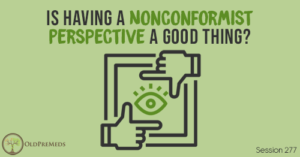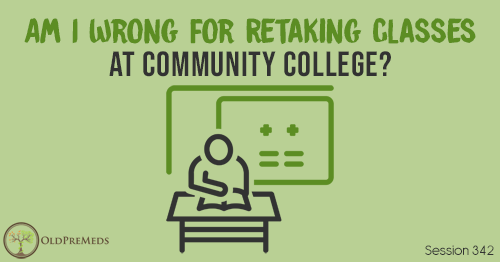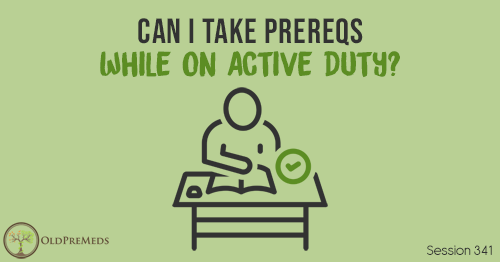Apple Podcasts | Google Podcasts
Session 277
Today, this student is concerned about things they have published in the past. They are wondering if it may be a problem later in the application process.
Questions answered here on the podcast are taken directly from the Nontrad Premed Forum over at premedforums.com. Please go ahead and register for an account, ask your question, and have fun with the community.
Also, please be sure to check out all our other podcasts on Meded Media as we try to bring you as many resources as you need on this journey.
Listen to this podcast episode with the player above, or keep reading for the highlights and takeaway points.
[00:58] Watch to Your Heart’s Content
If you didn’t know, I have a YouTube channel, premed.tv. Go subscribe over there. The most popular series right now is Application Renovation, where I look at students’ applications and find out why they didn’t get into medical school. A lot of it is very common mistakes that students are making. Hopefully, you can learn from those mistakes, so you don’t repeat them.
[01:22] The MCAT Minute
The MCAT Minute is brought to you by Blueprint MCAT.
One of the common struggles students have is around courses they need to take before taking the MCAT. And one of the biggest questions is biochem. It’s highly suggested that you take biochem for the MCAT. It’s hard because a lot of schools will make you take your organic series and then biochem in proper order.
“With the new MCAT that started in 2015, biochem is very important on the MCAT.”Click To TweetIf you’re trying to fit in the MCAT, then you’re like well what do you do about biochem? Sometimes, that can be self-taught. If you need to self-teach yourself only one course, that’s probably doable. Just make sure you add that time into the total amount of time that you are going to prep.
I’ve also talked about this topic before with Blueprint experts on The MCAT Podcast, which you should also go check out. And we first talked about this stuff back in Episode 9.
[02:59] OldPreMeds Question of the Week
“So I’ve written some fairly “controversial” content that illustrates the differences between “Science based medicine” and “Evidence based medicine.”
I’ve also written content about why psychology is not a science and a couple of other things. I am proud of these accomplishments but I fear admission committees will think “oh this guy is going to have a problem here.”
On the other hand, assuming they are not too offended to look at what I have said objectively, I think they may walk away from it thinking “this person can think critically and has the gusto to stand up against the grain.”
My observation is that medicine is PATHOLOGICALLY high in conformity and that these things will hurt my application. Anyone care to offer insight?”
[03:44] Medicine Being High in Conformity
I won’t give my take on whether psychology is a science or not because ultimately, it doesn’t matter. Because the question that’s being asked is whether being a nonconformist is a good thing or bad thing in an application. And my personal thought is that it’s not very good.
Now, I always talk about research being one of the most overrated parts of an application. And that’s because I think it is.
The goal of research is to inform the admissions committee on how inquisitive you are, how you like to ask questions, and how you like to potentially challenge the status quo.
'At the end of the day, medicine is high in conformity because people's lives are at stake.'Click To TweetYou need to conform to evidence-based medicine because lives are at stake. You need to conform to following orders that the attending gives you as a resident, as a fellow, or as a medical student because lives are at stake. There are particular reasons there’s a lot of conformity in medicine.
[05:54] Conformity vs. Hierarchy
“There's a difference between conformity and hierarchy.”Click To TweetHierarchy in medicine is a little weird, and potentially needs to go. But conformity, in terms of, for instance, you’re conforming to the way we treat diabetic ketoacidosis. Because we know based on evidence, this is what you’re supposed to do. You are conforming to the rules of the game.
There’s going to potentially be a lot of head scratching in an application from the admissions committee members and the reviewers of your application – if they start to wonder, are you going to be a pain in the butt? Are you going to be someone who just wants to stand out on the side because you love playing devil’s advocate? Nobody wants to be around a person like that.
And so, I am quite concerned that you’re trying to be the one who calls out all of this stuff and goes against the grain because they might not want to deal with this headache.
[07:23] Be Careful with How You Stand Out
Therefore, be very careful trying to stand out in that way. At the end of the day, you have to fall in line in some respect, when it comes to at least applying to medical school. Once you’re in, then potentially try to find where those boundaries are in your medical school.
When you’re in your clinical rotations or you’re in your residency, then find those boundaries where you can push back.
Pushing back is okay because that’s what research is all about. You’re asking questions. But to do it just for the sake of trying to say that psychology is not even real, there are some questionable motivations behind saying something like that.
Otherwise, you’re trying to dismiss a whole category of people out there and a whole career that people are both working in and getting help from. So I would be very careful doing that from day one, applying to medical school.
Your job when you apply to medical school is to show that you want to be a doctor, that you’re academically capable, and all of that fun stuff. During an interview process, they want to know if they’re going to want you to take care of their loved ones.
When it comes to residency applications, it even goes much further. A lot of residency interviews would be around – “Do I want to hang out with you for the next three years or four years?” “Are you a cool person that I’m going to want to go get beers with after our shift after our day?”
And if the answer is no because you’re the one that wants to always go against the grain, then that’s going to be hard.
[09:46] Do You Fit the Societal Norm?
Unfortunately, we’ve come to this place in society where there’s just no middle ground anymore. You either are an anti vaxxer or you’re a vaxxer. You’re a flat-earther or a round-earther. And if you’re out there spouting off some of this stuff, you’re going to potentially be lumped into the “crazy people” group. So you have to be very careful with that.
At the end of the day, it’s not just that you love medicine enough and you want to be a doctor enough. It’s not just that you’re academically capable enough. It’s about what are your societal norms? How are you going to fit in with our community with our society of patients and colleagues and classmates, residents, your future attendings, and all of those people?
And if you’re the ugly duckling in the group, there’s going to potentially be some problems. So, take that for what it’s worth. Do what you want, but be prepared to suffer the consequences.
Links:
The MCAT Podcast Session 9: What Prereqs Do I Have to Have to Take the MCAT












